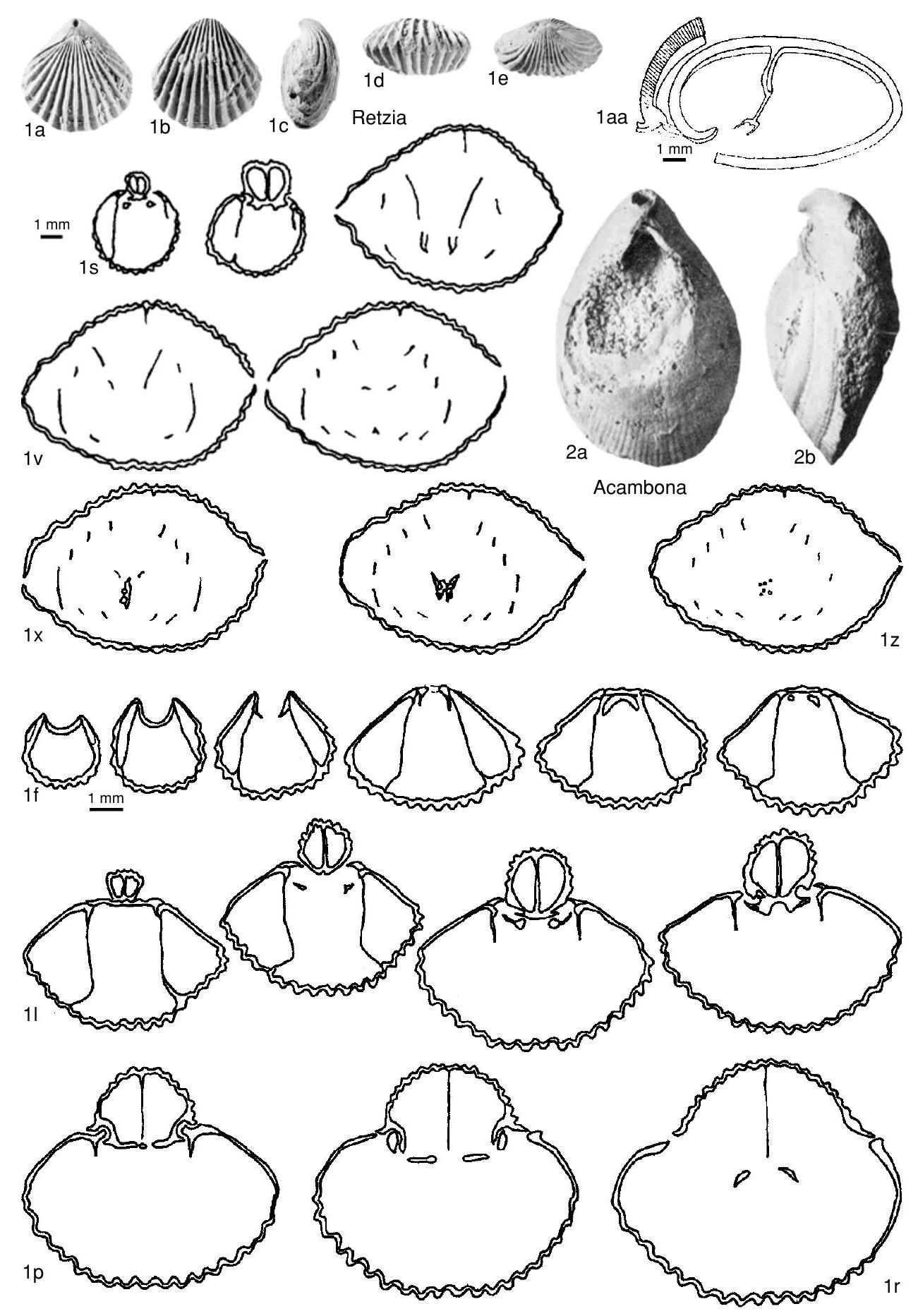Welcome to the Treatise on Invertebrate Paleontology!
Please enter a genera name to retrieve more information.

Retzia
Classification
Phylum:
Brachiopoda
Subphylum:
Rhynchonelliformea
Class:
Rhynchonellata
Order:
Athyridida
Suborder:
Retziidina
Superfamily:
Retzioidea
Family:
Retziidae
Formal Genus Name and Reference:
Retzia KING, 1850, p. 137
Type Species:
Terebratula adrieni de Verneuil & D'ARCHIAC, 1845, p. 471, OD
Images
(Click to enlarge in a new window)
Fig. 1083, 1a-aa. *R. adrieni (de Verneuil & d'Archiac), upper Emsian, Asturias, Spain, a-e, lectotype, dorsal, ventral, lateral, anterior, and posterior views, D852, de Verneuil Collection, x1 (new, photographs courtesy of N. Podevigne), f-r, transverse serial sections showing umbonal regions 0.20, 0.60, 0.80, 1.10, 1.30, 1.50, 2.10, 2.30, 2.60, 2.70, 2.90, 3.30, 3.60 mm from ventral umbo, DPO/F24242, s-z, transverse serial sections showing cardinalia and brachidium 1.30, 1.60, 5.00, 5.60, 6.00, 6.30, 6.40, 6.60 ~mm from ventral umbo, DPO/F24243 (new), aa, lateral view of jugum (Hall & Clarke, 1893).
Synonyms
Trigeria
Geographic Distribution
Fergana, ? Urals, ? Inner Mongolia, ?Ludlow; Spain, France, Germany, Kuznetsk, Altay, Novosibirsk area, southern China (Guangxi), Lower Devonian–Middle Devonian; Donetz, Kuznetsk, Kazakhstan, Siberia, northeastern China, Upper Devonian–Lower Carboniferous (Viséan).
Age Range
Beginning Stage in Treatise Usage:
upper Silurian (?Ludlow), Lower Devonian
Beginning International Stage:
Gorstian
Fraction Up In Beginning Stage:
0
Beginning Date:
426.74
Ending Stage in Treatise Usage:
Lower Carboniferous (Viséan)
Ending International Stage:
Visean
Fraction Up In Ending Stage:
100
Ending Date:
330.34
Description
Thin but high dental plates, pedicle collar well developed, cardinal flanges, thin and flat, projecting posteroventrally, hinge plate short, in comparison with long, flat outer hinge plates, supported by high, thin median septum, jugum projecting posteroventrally as long stem that may give rise to short, pronglike bifurcations or become thick and spiny
References
Museum or Author Information
Classification
Phylum:
Brachiopoda
Subphylum:
Rhynchonelliformea
Class:
Rhynchonellata
Order:
Athyridida
Suborder:
Retziidina
Superfamily:
Retzioidea
Family:
Retziidae
Formal Genus Name and Reference:
Retzia KING, 1850, p. 137
Type Species:
Terebratula adrieni de Verneuil & D'ARCHIAC, 1845, p. 471, OD
Images
(Click to enlarge in a new window)
Fig. 1083, 1a-aa. *R. adrieni (de Verneuil & d'Archiac), upper Emsian, Asturias, Spain, a-e, lectotype, dorsal, ventral, lateral, anterior, and posterior views, D852, de Verneuil Collection, x1 (new, photographs courtesy of N. Podevigne), f-r, transverse serial sections showing umbonal regions 0.20, 0.60, 0.80, 1.10, 1.30, 1.50, 2.10, 2.30, 2.60, 2.70, 2.90, 3.30, 3.60 mm from ventral umbo, DPO/F24242, s-z, transverse serial sections showing cardinalia and brachidium 1.30, 1.60, 5.00, 5.60, 6.00, 6.30, 6.40, 6.60 ~mm from ventral umbo, DPO/F24243 (new), aa, lateral view of jugum (Hall & Clarke, 1893).
Synonyms
Trigeria
Geographic Distribution
Fergana, ? Urals, ? Inner Mongolia, ?Ludlow; Spain, France, Germany, Kuznetsk, Altay, Novosibirsk area, southern China (Guangxi), Lower Devonian–Middle Devonian; Donetz, Kuznetsk, Kazakhstan, Siberia, northeastern China, Upper Devonian–Lower Carboniferous (Viséan).
Age Range
Beginning Stage in Treatise Usage:
upper Silurian (?Ludlow), Lower Devonian
Beginning International Stage:
Gorstian
Fraction Up In Beginning Stage:
0
Beginning Date:
426.74
Ending Stage in Treatise Usage:
Lower Carboniferous (Viséan)
Ending International Stage:
Visean
Fraction Up In Ending Stage:
100
Ending Date:
330.34
Description
Thin but high dental plates, pedicle collar well developed, cardinal flanges, thin and flat, projecting posteroventrally, hinge plate short, in comparison with long, flat outer hinge plates, supported by high, thin median septum, jugum projecting posteroventrally as long stem that may give rise to short, pronglike bifurcations or become thick and spiny
